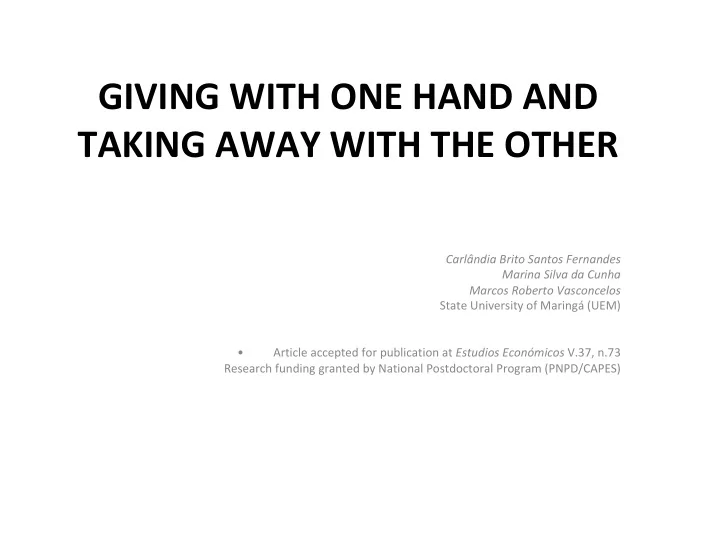

GIVING WITH ONE HAND AND TAKING AWAY WITH THE OTHER Carlândia Brito Santos Fernandes Marina Silva da Cunha Marcos Roberto Vasconcelos State University of Maringá (UEM) • Article accepted for publication at Estudios Económicos V.37, n.73 Research funding granted by National Postdoctoral Program (PNPD/CAPES)
Introduction • The question of inequality has assumed a prominent place in debates on economic policy, especially following the global financial crisis and the academic and political repercussions of Piketty's book (2014). • This debate has drawn attention to the capacity and importance that fiscal policy may have in mitigating income imbalances among individuals in an economy.
Introduction • The aim of this study is to empirically estimate the impact of the structure of expenditures and revenues on income inequality for the Brazilian states. • What is the impact of fiscal policy on the inequality of the Brazilian states?
Introduction • The contributions of the article: – To provide evidence of the relationship between fiscal policy and income inequality at the level of the Brazilian states, filling an existing gap in the literature. – To give justifications for policy makers to implement fiscal policies that promote the reduction of income inequality in the country.
Literature Review • The level of income inequality, especially in developing countries, can be reduced by the direct action of fiscal policies (TANZI, CHU, 1992); The inequality in income distribution can be partially explained by the • level and progressiveness of taxes and government spending policies [ Bastagli et al. (2012), Chu et al. (2004) and Woo et al. (2013)]; The fiscal system of Latin American countries fails to fulfill its • redistributive function [Goñi et al. (2011)]; – Colombia: Joumard and Vélez (2013) – Peru: Jaramillo (2017) – Brazil: Higgins and Perreira (2014); Medeiros and Souza (2015); Gobetti and Orair (2017) Others authors find that the tax structure is favorable to the distributive • function of the State: – Uruguay: Bucheli et al. (2014) – Argentina: Cont and Porto (2016) ; Rossignolo (2018) Several studies show the positive role of the fiscal system in improving the • income distribution in the countries of this region [Cornia (2014), González and Martner (2012), Clifton et al. (2017);
Data • Data are from the National Treasury Secretary: budget execution • The Gini index, the measure of inequality, decreased from 0.56 in 2004 to 0.50 in 2014 – This reduction is associated with programs that target income transfers at poor households, as the Bolsa Família Program [Góes and Karpowicz, 2017; Lustig et al., 2013; Soares et al., 2009, 2010) Góes and Karpowicz (2017)] – The real increase in the minimum wage, the increase in formalization in the labor market, and the improvement in workers’ educational level (Gonzáles and Martner, 2012).
Data Graph 1: Aggregate social expenditures of Brazilian states, 2004-2014 (billions of R$) 350.00 300.00 250.00 200.00 150.00 100.00 50.00 0.00 2004 2005 2006 2007 2008 2009 2010 2011 2012 2013 2014 Assistance Health Education Source: prepared by the authors on the basis of official data from the National Treasury. Note: Data deflated by IPCA at December 2014 prices.
Econometric Model We use System Generalized Method of Moment (GMM) Stata command: xtabond2
Table 1: The Impact of Fiscal Policy on Inequality (System GMM Results) Note: data in 10,000 Reais per capita
Table 2: Adding Controls in the Benchmark Regressions (System GMM Results)
Final Considerations • The fiscal policy of the Brazilian states is important for reducing inequality in income distribution; • However, those responsible for conducting the fiscal policies of the Brazilian states must be aware that an increase in spending with special charges worsens inequality, and this is strongly shown in the results of this study; • The net effect of fiscal policy on inequality may not be positive mainly because the tax system is still very regressive and many of the resources are spent on debt; • The states and the federal district have the room to implement pro-equity (or anti-equity) fiscal policies; • We emphasize the need to promote a tax reform capable of establishing a more progressive structure in the country;
Thank you!
Recommend
More recommend